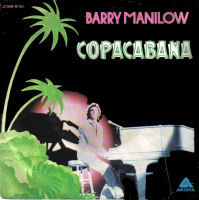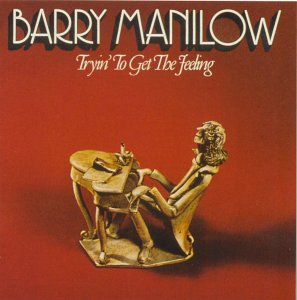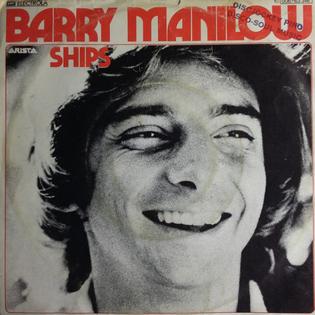
"Copacabana", also known as "Copacabana (At the Copa)", is a song recorded by Barry Manilow. Written by Manilow, Jack Feldman, and Bruce Sussman, it was released in 1978 as the third single from Manilow's fifth studio album, Even Now (1978). The same year, "Copacabana" appeared in the soundtrack album of the film Foul Play.

"I Write the Songs" is a popular song written by Bruce Johnston. Barry Manilow's version reached number one on the Billboard Hot 100 chart in January 1976 after spending two weeks atop the Billboard adult contemporary chart in December 1975. It won a Grammy Award for Song of the Year and was nominated for Record of the Year in 1977. Billboard ranked it as the No. 13 song of 1976.

"Brandy", later called "Mandy", is a song written by Scott English and Richard Kerr. It was originally recorded by English in 1971 and reached the top 20 of the UK Singles Chart.
"Sing" is a 1971 song written by Joe Raposo for the children's television show Sesame Street as its signature song. In 1973, it gained popularity when performed by the Carpenters, a number 3 hit on the Billboard Hot 100.

Tryin' to Get the Feeling is the third studio album by singer-songwriter Barry Manilow, released in 1975. It features the title track, "Tryin' to Get the Feeling Again", together with other hits including "New York City Rhythm", "Bandstand Boogie" and the chart-topping "I Write the Songs". The album debuted on the Billboard Top 200 Chart on November 8, 1975, reaching number five in early 1976, and eventually was certified double platinum. It peaked at No. 24 on Canada's RPM Album Chart.

"Could It Be Magic" is a song written by Adrienne Anderson and composed by American singer-songwriter Barry Manilow, inspired by Frédéric Chopin's Prelude in C minor, Opus 28, Number 20.

"Weekend in New England" is a song recorded by Barry Manilow for his fourth studio album, This One's for You (1976). Written by Randy Edelman, it was released as the second single from the album, and became a Top Ten hit on the Billboard Hot 100, while topping the Adult Contemporary chart.

"Can't Smile Without You" is a song written by Christian Arnold, David Martin and Geoff Morrow, and recorded by various artists including Barry Manilow and the Carpenters. It was first recorded and released by David Martin as a solo single in 1975. The version recorded by Manilow in 1977 and released in 1978 is the most well-known.

"Solitaire" is a ballad written by Neil Sedaka and Phil Cody. Cody employs playing the card game of solitaire as a metaphor for a man "who lost his love through his indifference"—"while life goes on around him everywhere he's playing solitaire". The song is perhaps best known via its rendition by Carpenters. Another version by Andy Williams reached number 4 in the UK Singles Chart in 1973.

"Cherish" is a pop song written by Terry Kirkman and recorded by the Association. Released in 1966, the song reached number one on the U.S. Billboard Hot 100 in September of that year and remained in the top position for three weeks. Billboard ranked the record as the No. 7 song of 1966, and later as No. 2, after a revision of the year-end charts. It was certified Gold by the RIAA in the US in 1966. In Canada, the song also reached number one.

"I Won't Last a Day Without You" is a song by The Carpenters with lyrics written by Paul Williams and music composed by Roger Nichols. The writing duo had previously contributed "We've Only Just Begun" and "Rainy Days and Mondays" to the Carpenters.

"Only Yesterday" is a song recorded by the Carpenters. Released on March 14, 1975, the song was composed by Richard Carpenter and John Bettis. "Only Yesterday" peaked at number four on the Billboard Hot 100 and number one on the Adult Contemporary (AC) charts, The Carpenters' eleventh number one on that chart.

"Somewhere Down the Road" is a popular song written by Cynthia Weil and Tom Snow and most famously recorded in 1981 by Barry Manilow. Weil wrote the song's lyrics and Snow wrote the melody.

"It's a Miracle" is a 1975 single by Barry Manilow and was the second release from his album, Barry Manilow II. "It's a Miracle" went to number twelve on the U.S. Billboard Hot 100 and was Manilow's second number one on the U.S. Easy Listening chart, spending one week at number one in April 1975. The single also peaked at number fifteen on the disco/dance chart, and was the first of four entries on the chart. "It's a Miracle" was followed by "Could It Be Magic".

"This One's for You" is the title track from the 1976 album by Barry Manilow with words and music by Manilow and Marty Panzer. The song peaked at number 29 on the Billboard Hot 100, and at number one on the Easy Listening chart, reaching the top position for one week in November 1976, Manilow's fifth number one overall on that chart.
"The Old Songs" is a song written by David Pomeranz and Buddy Kaye and was featured in Pomeranz's 1980 album, The Truth of Us. In 1999, the song was re-recorded again in Pomeranz's 1999 album, Born for You: His Best and More.

The Feeling's Not Right Again is a collection of previously recorded songs by Ray Stevens, released in 1979. All of the selections were chosen from his studio albums that were recorded for Warner Bros. Records. Stevens had a total of five singles released by Warner Bros., but only three are featured on this collection; the rest of the selections are album tracks. The first track, "I Need Your Help Barry Manilow," is a novelty single that made its first album appearance on this collection; both it and the title track are homages to singer-songwriter Barry Manilow, and the album's cover art is itself a spoof of Manilow's album Tryin' to Get the Feeling. "I Need Your Help Barry Manilow" was a minor hit for Stevens, narrowly missing the top 40 of the Billboard Hot 100 and reaching #11 on the adult contemporary music charts.

"Ships" is a song written and originally performed by British musician Ian Hunter. The song was first released on Hunter's fourth solo album, You're Never Alone with a Schizophrenic in March 1979, and later released as a single in August 1979. Hunter's release of the single never made the charts. The song is said to be about Ian's relationship with his father.

"I Need Your Help Barry Manilow" is a 1979 song by Dale Gonyea, sung by Ray Stevens. It was the first track on Stevens' album, The Feeling's Not Right Again. The single's release in March preceded the release of the album in June.
Butterscotch were an English soft rock band which consisted of Chris Arnold, David Martin and Geoff Morrow, who are also known collectively as the songwriting and record production trio Arnold, Martin and Morrow. They are best known for their top 20 UK and Ireland hit, "Don't You Know ".
















